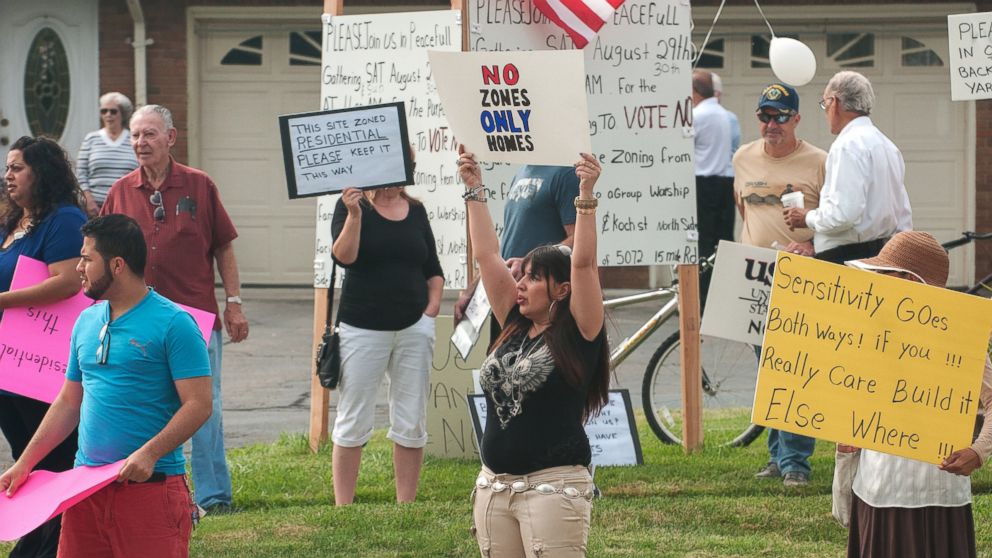US Department of Justice Sues Michigan City After Permit to Build Mosque by Religious Group Is Denied
The U.S. Department of Justice accused the city of acting on "anti-Muslim bias."

— -- The U.S. Department of Justice has filed a lawsuit today against the city of Sterling Heights, Michigan, alleging that the city discriminated against a local Muslim community center "on the basis of religion" when it denied the center's special land use approval application to build a mosque.
The American Islamic Community Center (AICC)-- which is currently located in Madison Heights, Michigan -- has been hoping "to build a mosque in Sterling Heights because the location is more convenient for its members and its current space has become inadequate for its religious, educational and social needs," the DOJ said in a news release today.
In July 2015, the AICC submitted a special approval land use application with the city to build a 20,500-square-foot mosque, according to a complaint filed by the DOJ in federal court.
A vote on the application was scheduled for Aug. 13, 2015, but was postponed to Sept. 10, 2015, after 50 members of the public spoke out at a Sterling Heights City Planning Commission meeting against the proposed mosque, the DOJ said in the complaint.
"Many of the comments were directed at the religion of the Petitioner [an AICC board member], including a plea to 'Remember 9/11,' statements that Christians would not be allowed to build a church in Iraq and statements that property values would drop if a mosque were built in the neighborhood," the complaint read.
Before the Sept. 10, 2015, vote, numerous members of the public attended other city meetings and made "anti-Muslim statements" against the AICC's application, the DOJ wrote in the complaint.
At one city council meeting, a resident "held up a picture of a woman wearing a garment that covered her head and stated that he did not want to 'be near people like this,'" the DOJ said. During the same meeting, the DOJ said another resident suggested the mosque "might be used as a facility to store weapons," and a city councilman stated that while "I respect [Muslims] ... there are certain sects of them that shouldn't be in this country."
The Sterling Heights City Planning Commission "unanimously voted" to deny the AICC's application to get a special land use approval to build the mosque, the DOJ said.
The DOJ added that the city's decision was "based on anti-Muslim bias" and violated the Religious Land Use and Institutionalized Persons Act of 2000 (RLUIPA), which "contains multiple provisions prohibiting religious discrimination and protecting against unjustified burdens on religious exercise."
In response to the lawsuit filed by the DOJ, the city of Sterling Heights released the following statement:
"Sterling Heights has a solid reputation for inclusiveness and tolerance reflected in a wide variety of places of worship across the City, including two existing Mosques, a Sikh Temple, a Buddhist Temple, Christian churches of various denominations and a BAPS Shri Swaminarayan Mandir. Sterling Heights will continue to foster faith-based inclusiveness and understanding with local partners including our city's school districts, religious organizations and other community groups.
"With the above in mind, the City has cooperated fully with the Department of Justice in this matter, and is surprised and disappointed in its decision to initiate this lawsuit at this time. The City maintains that the AICC application for special approval land use to construct a mosque was considered and denied by the City's Planning Commission based on established land use criteria including the incompatibility with adjoining uses, insufficient parking, as well as overall size and height of the building, and not emotional feelings tied to religious beliefs either for or against the applicant."
The AICC did not immediately respond to ABC News' requests for comment on the lawsuit today.
According to The Associated Press, the AICC filed its own federal civil suit this past summer.
The AP reported that Azzam Elder, the AICC's attorney, said that the lawsuit was filed so the AICC could "build a new house of worship for the community." He added, "It's egregious what the city has done to its own residents which happen to be of a different faith."
ABC News' Geneva Sands contributed to this report.




